Psychiatry Shelf Study Tips

It’s no Freudian slip - the AMBOSS Psychiatry Shelf has launched and we are excited to share the release with you! With summer in full throttle, there’s no better time than now to practice a little Shelf control and take a peek at our USMLE-style questions.
One of the most interesting clerkship rotations you get to partake in is psychiatry - the place where some of the more unexpected things may happen. All the more reason to be prepared! Slash through the Psychiatry Shelf stems with ease and quickly narrow down your answer choices with AMBOSS. The AMBOSS Psychiatry Shelf contains over 200 case-based questions which envelope all relevant, high-yield topics according to the USMLE outline, including eating disorders, antidepressants, substance abuse, defense mechanisms, schizophrenia and many more.
To succeed on the Psychiatry Shelf, it is important to know the basics of psychiatry inside and out! What better way to get some inside tips and tricks than to ask a doctor who has first-hand knowledge of the requirements! Here are some study tips from Angela, who successfully completed the Psychiatry Shelf Exam last year.
Study Tips:
Manage Your Time
The Psychiatry Shelf Exam question stems are very long. Therefore, timing could be your greatest challenge! We suggest the following:
- Skip past the questions you don’t know, and gather all the points on the ones you do.
- Don’t linger on tricky questions.
- Utilize AMBOSS Exam Simulation to study under exam-like conditions. With Exam Simulation, you can test yourself in a near identical testing environment as the USMLE Psychiatry Shelf Exam, which is both timed and includes similar questions as to what you will be asked.
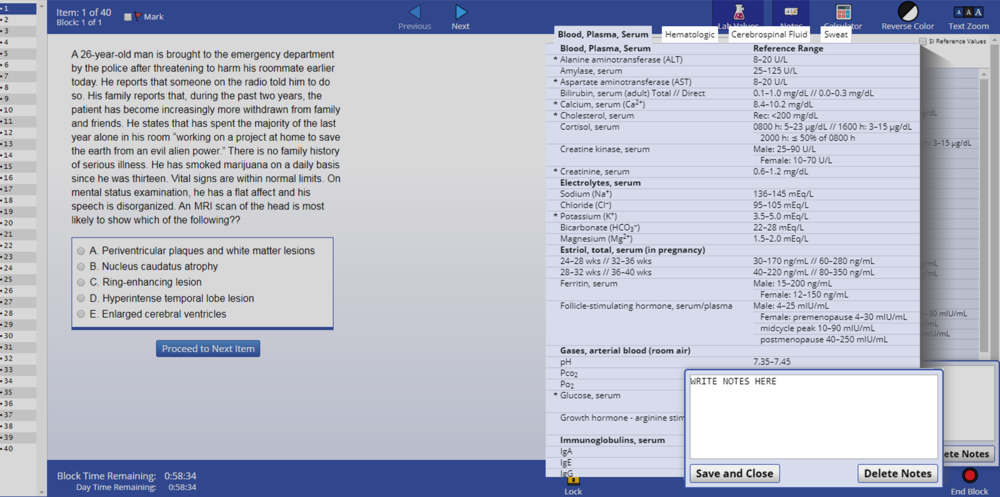 With Exam Simulation you can create custom study sessions tailored to exactly what you need to learn – not what you already know.
With Exam Simulation you can create custom study sessions tailored to exactly what you need to learn – not what you already know.
Know Your Disorders
It is imperative to know all of the mood disorders, psychotic disorders and anxiety disorders. Most of the major diseases will have multiple questions on the exam, which may seem vague, where at least two answers seem plausible. We suggest the following:
- Pair the AMBOSS Qbank with the interactive clinical knowledge library to get in-depth insight into these disorders, so you are well prepared when the exam comes around.
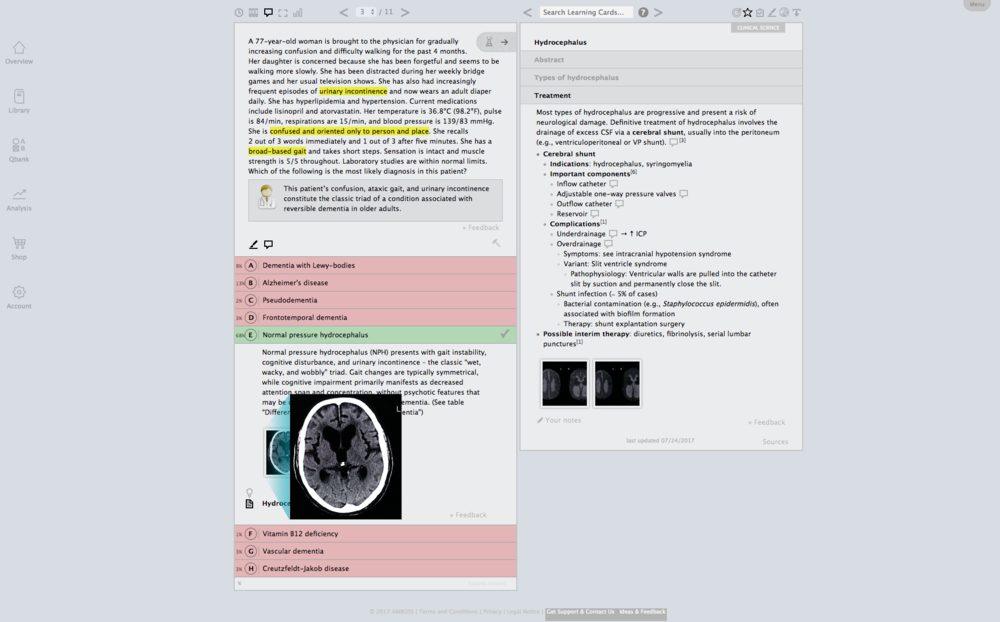 Crosslinked content lets you synchronize your learning all in one place.
Crosslinked content lets you synchronize your learning all in one place.
Study Side Effects
To perform well on the exam, learn all of the major side effects for the psych drugs, such as neuroleptic malignant syndrome, serotonin syndrome, and EPS with typical antipsychotics to name a few. We suggest the following:
- Access the AMBOSS clinical knowledge library to find extensive information on subtypes, onset, symptoms, treatments, side effects and much more.
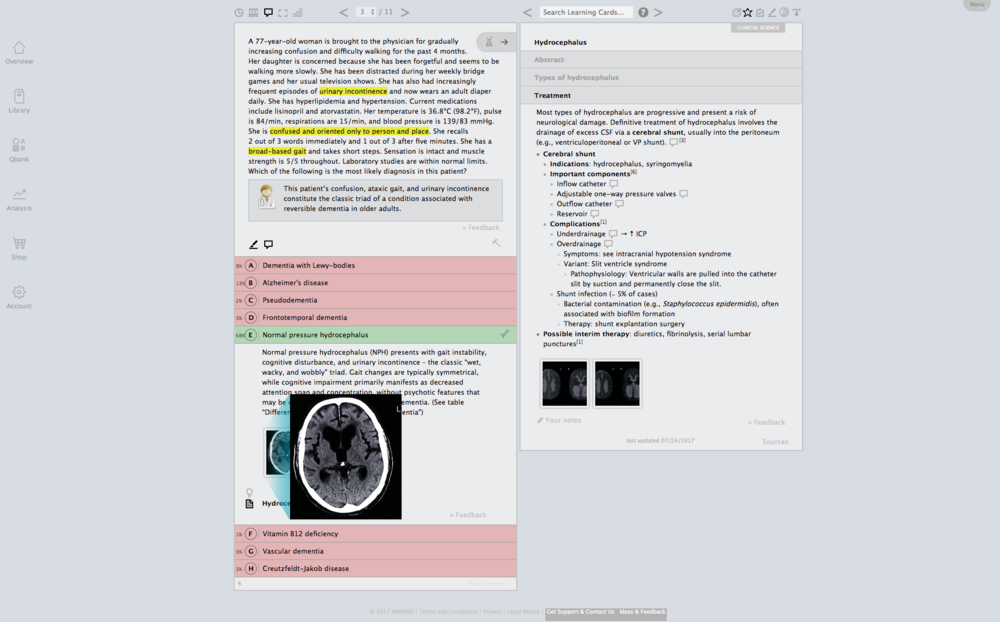
-2.png)
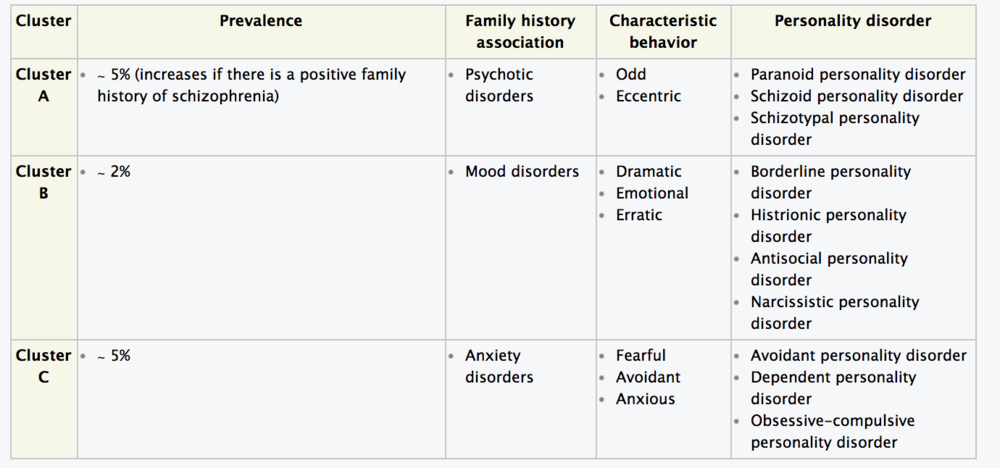
Investigate Test Findings
You will encounter questions regarding “test” findings differentiating various diseases. We suggest the following:
- Study up on MRI, laboratory, EEG and sleep study findings.
- Access thousands of visual resources within the AMBOSS extensive visual library, which includes overlays and SmartZoom features on many images.
 Learn to interpret results with real clinical data. Toggle-on overlays and illustrations to point out exactly what you need to see, from X-rays to EKGs.
Learn to interpret results with real clinical data. Toggle-on overlays and illustrations to point out exactly what you need to see, from X-rays to EKGs.
Review Neurology Shelf Questions
There will be some neurology questions within the USMLE Psychiatry Shelf Exam. Therefore, it is important to utilize a platform that can help you pinpoint areas of weakness in both subjects - neurology and psychiatry - since there is some overlap on the Psychiatry Shelf Exam. Therefore, we suggest the following:
- If you need to brush up on neurology, you can create a custom session and access over 360 questions from the AMBOSS Neurology Shelf Qbank.
- Take advantage of the AMBOSS advanced personal study analytics program to pinpoint weaknesses and knowledge gaps specific for neurology topics based upon your psychiatry study results or visa versa.
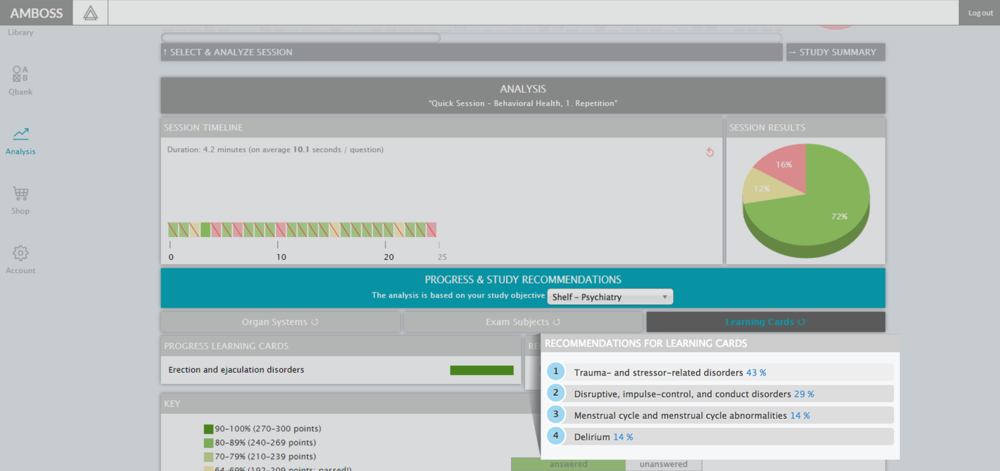 When answering questions within the Psychiatry Qbank, you can pinpoint knowledge gaps in both psychiatry and neurology-related topics, which is a very unique feature of the AMBOSS platform.
When answering questions within the Psychiatry Qbank, you can pinpoint knowledge gaps in both psychiatry and neurology-related topics, which is a very unique feature of the AMBOSS platform.
Probe Illicit Drug Use
You will encounter many questions on illicit drug use. We suggest the following:
- Utilize the AMBOSS clinical knowledge library, where you will be able to identify drugs used based on vitals and access key buzzwords (i.e. bugs crawling on their skin, turbinate erythema, conjunctival injection).
- Within the library, you will be able to recognize the different stages of withdrawal, and indicate which drugs to administer during withdrawal from drugs and alcohol.
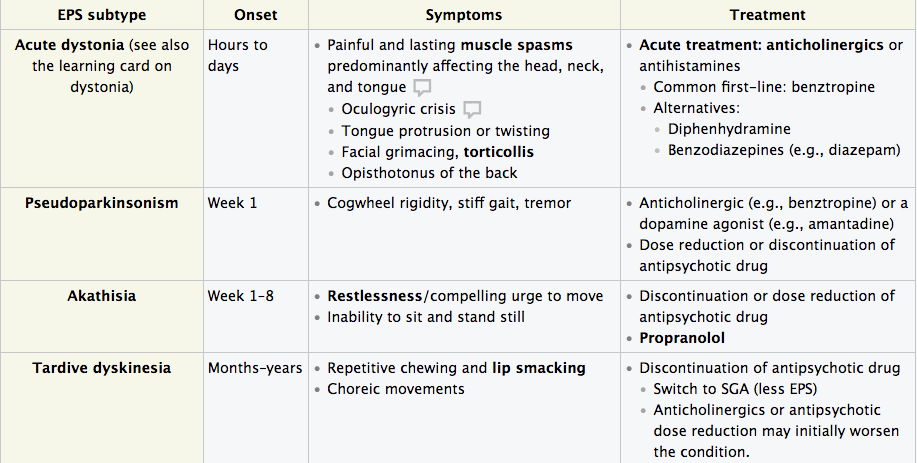 Access extensive, high impact content by exploring flowcharts and/or flipping on the high-yield mode to condense topics.
Access extensive, high impact content by exploring flowcharts and/or flipping on the high-yield mode to condense topics.
Explore Sleep Disorders
There will be a number of sleep disorder questions, such as narcolepsy, sleep terrors, circadian rhythm disorder and more. We suggest the following:
- Access the epidemiology, etiology, pathophysiology, clinical features, diagnostics, treatment, complications and prognosis for each of these disorders within the AMBOSS platform.
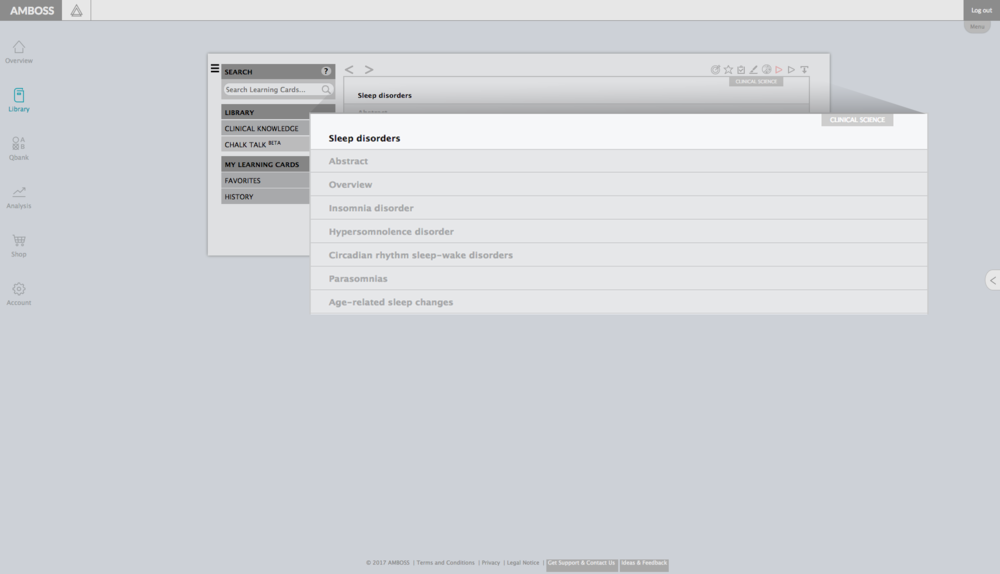 Within the AMBOSS extensive library, you can access continuously updated clinical content with a wide range of topics crosslinked with every question.
Within the AMBOSS extensive library, you can access continuously updated clinical content with a wide range of topics crosslinked with every question.
Get psyched for psych. Check out our Psychiatry Shelf today! Sign up now to study with AMBOSS and prep for your next exam!
